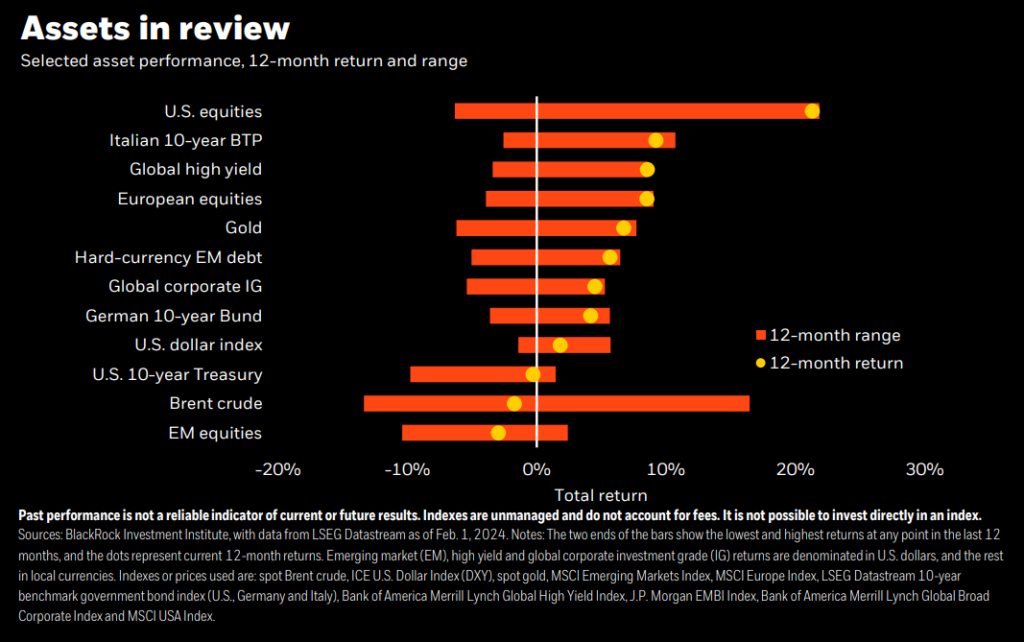
| Stephen Yiu is the Chief Investment Officer at Blue Whale Capital and Lead Manager of the Blue Whale Growth Fund. Stephen co-founded Blue Whale Capital with Peter Hargreaves, co-founder of Hargreaves Lansdown, in 2016. The Blue Whale Growth Fund was launched in September 2020 and is a long-only global equity fund focusing on developed markets. Stephen adopts a high conviction, active approach based on bottom-up, fundamental research. |
Given the major correction seen almost across the board in 2022, 2023 offered up more benign conditions for investors.
The Blue Whale Growth Fund performed particularly strongly, posting a return of +36.9% (T Acc USD Class1), +32.0% (T Acc EUR Class2), and +29.3% (T Acc GBP Class3) versus the IA Global4 sector average of +12.7%. Please be mindful that past performance is not a guide to future performance.
Macro and geopolitics
On the macro side, inflation and interest rates continued to dominate headlines as they had done the previous year. Our assertion that holding quality businesses to beat an inflationary environment played out. Their high margins and strong pricing power helped them to transcend the tricky macro-economic environment.
At the start of the year many were predicting a recession in the US. As the year progressed, however, sentiment changed as data suggested the US would come in for a soft landing, which in turn steadied the markets.
With the continued war in Ukraine and the latest conflict in Israel and Palestine, global geopolitics tried to ruin the party once again. However, much of the downside from the Ukraine conflict had already been priced in, and only a small blip was seen following the events of October 7th in the Middle East. We continue to monitor the region closely as an escalation could see a more damaging, long-term effect on the global economy.
Megatrends – a changing of the guard
Up until 2021, the main structural global megatrend had been that of digitisation. Whilst this trend continued in 2023 (and will likely continue for many years to come), the potential for outsized investment gains diminished as the pace of change decelerated following the pandemic.
The natural progression of digitisation was AI and automation, and 2023 could be seen as the beginning of this next global megatrend. At Blue Whale we had already started positioning the portfolio for this trend in 2021, with companies such as Nvidia and Lam Research sitting in the portfolio. However, it was the proliferation of AI and its democratisation in 2023 which delivered the share price gains that investors were hoping for from this new stage in technological evolution. Through the development of services such as ChatGPT, DALL-E and Midjourney, and the deployment of AI by global tech titans such as Microsoft and Adobe, AI became something consumers could start benefitting from, as well as big businesses.
The obvious winner of this proliferation of AI was Nvidia. As the leading maker of the hi-tech processors used to power the AI revolution, the stock fulfilled our prediction of becoming the next trillion-dollar company, to sit alongside Alphabet, Amazon, Apple and Microsoft in this exclusive club. The largest holding in the fund for much of the year, it delivered gains of nearly 250% in 2023 alone.
Portfolio change and detractors
We started 2023 with a portfolio of companies that we felt would reassert themselves to drive outperformance for the fund. During the year the majority of the Top 10 remained consistent, with stalwarts such as Microsoft, Mastercard, Visa and Nvidia holding their place whilst delivering pleasing performance.
There were a few notable additions and disposals in the fund in 2023. Applied Materials entered the fund, taking the place of ASML. Whilst similar companies, both in the semiconductor sector, ASML was sold on valuation grounds, with Applied Materials offering, what we believe to be, greater upside potential.
Autodesk was another stock making way in the portfolio. Whilst we still like the business, we felt greater opportunity lay with other companies, such as Adobe, which are better able to leverage AI in the creative space. Adobe, whilst it had always maintained its position in the portfolio, moved back into the Top 10 accordingly.
Meta was the headline re-entry into the fund. Having sold out of the business in early 2022, we re-entered last year off the back of its clear potential with generative AI, given its wealth of consumer data.
The final two major changes were an entry for Danaher, offering similar opportunity as Sartorius in the biotech space. Intuit made way in the portfolio purely on valuation grounds, with greater opportunity for upside seen elsewhere.
Whilst 2023 saw positive returns for much of the portfolio, certain sectors experienced their fair share of disappointment – most notably banks. Consequently, our investment in Charles Schwab was one of the main detractors from performance in the year. Worries over solvency of US banks – particularly smaller, regional lenders – led to a sector-wide nosedive in March. However, we view Charles Schwab as a net beneficiary of likely subsequent consolidation of the US banking sector and see it as a key investment to benefit from higher interest rates as it delivers a healthy return on its cash deposits. As we saw very limited risk of permanent loss of capital (our main consideration when looking at risk factors) and with the fundamentals of the business firmly intact (it is the largest investment platform in the US, with over $8 trillion AUM.), we bought more of the stock as its valuation became more attractive.
Sartorius shares also took a dip early in 2023 following news of an acquisition, and investors stayed away from the bioprocessing business for much of the rest of the year. However, again we felt the fundamentals of the business remained sound and purchased more of the stock at its depressed price.
Looking forward
I will finish this review in much the same way as I finished the last in pointing out our truly active approach to managing the WS Blue Whale Growth Fund means we can adapt to the world as it changes. Our robust process continues to evolve, but is based on two key elements:
We continue to invest in high quality companies: the ability of companies to exhibit fundamental outperformance is constantly in flux and our team of investment professionals will continue to chart these changes.
We maintain a strict valuation discipline: the market is a dynamic beast and prices often diverge from what we see in the fundamentals – but we will never invest into low quality companies (or businesses) that may be at the mercy of cyclical economic gravity.
Looking forward, the portfolio is positioned to take advantage of what we see as the key issues of the year to come – AI and the automation revolution, reshoring and deglobalisation, and a general shift from consumer facing businesses to industrials.
With Russia continuing to flex its muscles, a delicate situation in the Middle East and China sabre rattling around Taiwan and the South China Sea, the world is precariously balanced. In addition to this, 2 billion people will go to the polls in 2024 as major elections around the world take place. Unsurprisingly, geopolitics will likely be the focus in the press over the coming year. Whilst inflation and interest rates will play second fiddle to geopolitics, we anticipate monetary policy to still command its fair share of column inches over the year. Although inflation is expected to be brought under control in many of the world’s major economies, interest rates are likely to rebase at a higher rate than has been seen for over a decade.
With these macroeconomic headwinds we feel it is important to invest in those companies which can take advantage of underlying trends in the global economy, and therefore transcend the greater macroeconomic uncertainty. The portfolio is positioned accordingly.
Please note that references to the LF Blue Whale Growth Fund in the article are provided for information purposes only; it is a UK UCITS which is not registered for sale in, nor promoted, to investors in the EEA. The Blue Whale Investment Funds ICAV Blue Whale Growth Fund was launched in September 2020 and is available to MeDirect clients. Whilst the investment objectives and charges are not identical, both funds are run on the same investment process.
Blue Whale Growth Fund is manufactured by Blue Whale Capital LLP and represented in Malta by MeDirect Bank (Malta) plc.
Blue Whale Key Risks & Disclaimers:
The Blue Whale Growth Fund was launched in September 2020. All references to actions before this date relate to the LF Blue Whale Growth Fund. Information on the LF Blue Whale Growth Fund is provided for comparison purposes only; it is a UK UCITS which is not registered for sale in nor is it promoted to investors in the EEA. Whilst the investment objectives and charges are not identical, both funds are run on the same investment process.
Please note that the information provided in this article is not to be construed as advice and any views we express on holdings do not constitute investment recommendations and must not be viewed as such. If you are unsure as to the suitability of an investment for your circumstances, please seek independent financial advice. Investments can go down in value as well as up so you may get back less than you invested. Your capital is at risk. Past performance is not a guide to future performance.Blue Whale Capital LLP is authorised and regulated by the UK Financial Conduct Authority.
There are significant risks associated with investment in the Fund referred to herein. Investment in the Fund is intended for investors who understand and can accept the risks associated with such an investment including potentially a substantial or complete loss of their investment.
Past performance is not a guide to future performance. The value of investments and any income derived from them can go down as well as up and the value of your investment may be volatile and be subject to sudden and substantial falls.
Investment in a Fund with exposure to emerging markets involves risk factors and special considerations which may not be typically associated with investing in more developed markets. Political or economic change and instability may be more likely to occur and have a greater effect on the economies and markets of emerging countries. Adverse government policies, taxation, restrictions on foreign investment and on currency convertibility and repatriation, currency fluctuations and other developments in the laws and regulations of emerging countries in which investment may be made, including expropriation, nationalisation or other confiscation could result in loss to the Fund.
Income from investments may fluctuate. Changes in rates of exchange may have an adverse effect on the value, price or income of investments. Fund charges may be applied in whole or part to capital, which may result in capital erosion. The Authorised Corporate Director may apply a dilution adjustment as detailed in the Prospectus. The Fund is not traded on an exchange or recognised market.
The foregoing list of risk factors is not complete, and reference should be made to the Fund’s Prospectus, KIID and application form.
MeDirect Disclaimers:
This information has been accurately reproduced, as received from Blue Whale Growth Fund. No information has been omitted which would render the reproduced information inaccurate or misleading. This information is being distributed by MeDirect Bank (Malta) plc to its customers. The information contained in this document is for general information purposes only and is not intended to provide legal or other professional advice nor does it commit MeDirect Bank (Malta) plc to any obligation whatsoever. The information available in this document is not intended to be a suggestion, recommendation or solicitation to buy, hold or sell, any securities and is not guaranteed as to accuracy or completeness.
The financial instruments discussed in the document may not be suitable for all investors and investors must make their own informed decisions and seek their own advice regarding the appropriateness of investing in financial instruments or implementing strategies discussed herein.
If you invest in this product you may lose some or all of the money you invest. The value of your investment may go down as well as up. A commission or sales fee may be charged at the time of the initial purchase for an investment. Any income you get from this investment may go down as well as up. This product may be affected by changes in currency exchange rate movements thereby affecting your investment return therefrom. The performance figures quoted refer to the past and past performance is not a guarantee of future performance or a reliable guide to future performance. Any decision to invest in a mutual fund should always be based upon the details contained in the Prospectus and Key Investor Information Document (KIID), which may be obtained from MeDirect Bank (Malta) plc.



